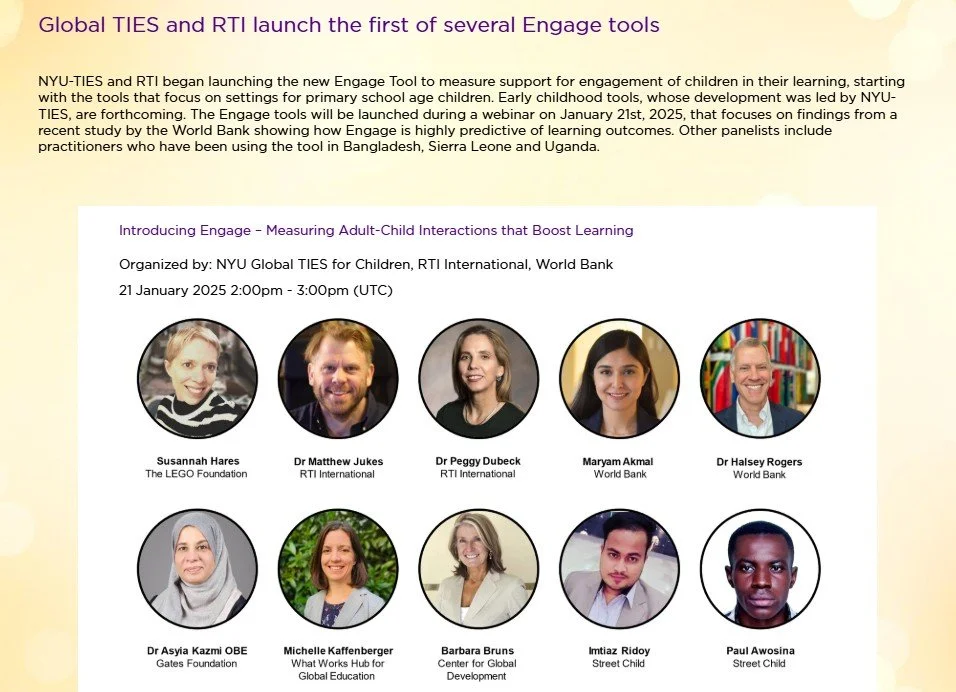Resources
Global TIES and RTI launch the first of several Engage tools
NYU-TIES and RTI began launching the new Engage Tool to measure support for engagement of children in their learning, starting with the tools that focus on settings for primary school age children. Early childhood tools, whose development was led by NYU-TIES, are forthcoming. The Engage tools will be launched during a webinar on January 21st, 2025, that focuses on findings from a recent study by the World Bank showing how Engage is highly predictive of learning outcomes. Other panelists include practitioners who have been using the tool in Bangladesh, Sierra Leone and Uganda.
Cluster randomized controlled trial of a phone-based caregiver support and parenting program for Syrian and Jordanian families with young children
This study assessed a 6-month phone-based early childhood development (ECD) intervention for Syrian and Jordanian caregivers in Jordan
Supporting Children’s Holistic Development in Contexts of Conflict and Crisis: Lessons from a decade of striving towards research that is effective, equitable and sustainable
In reflecting upon a decade of research at NYU Global TIES aimed at supporting children's holistic development within contexts of conflict and crisis, this white paper encapsulates our collective learnings from working with a network of actors in low- and middle-income and conflict affected contexts who aim to understand what works, how, and for whom. The goal of this paper is to distill insights from the diverse perspectives and experiences of dedicated researchers, inspire action, and provide recommendations for a future distinguished by inclusive and impactful outcomes.
Effects of a Father Engagement Model in Rohingya Camps and Host Communities in Cox’s Bazar, Bangladesh: A Randomized Controlled Trial
This study is a causal impact evaluation of Watch, Play, Learn (WPL), a program by Sesame Workshop that consists of videos that aim to bring playful early learning opportunities to children, especially those affected by conflict and crisis, via mobile phones. This study focused on the effects of WPL math and social-emotional skills content delivered to Venezuelan migrants and Colombian children living in communities in Colombia where families and children face challenges in accessing essential services, including early education. Implementation was led by the Colombia office of Innovations for Poverty Action.
HOLAS Assessment Bank
The Holistic Learning Assessment System (HOLAS) Bank is a curated inventory of educational tools/assessments and relevant monitoring and evaluation (M&E) resources designed for use and/or implemented in Colombia and Peru.
Gobee learning agenda: Our top six learnings from developing an edtech tool for emergency settings
Gobee, a prototype assessment tool for emergency settings, set out to make it easier for teachers and facilitators to measure children’s learning progress. Following the initial stages of development, War Child and NYU Global TIES share their learnings and publish the codes on an open-source platform.
Lessons from an Implementation Study of Integration of Early Childhood Development (ECD)Information and Guidance into Well-Child Visits in Primary Healthcare Centers run by Jordan’s Ministry of Health
This study, led by Global TIES for Children at New York University in collaboration with the International Rescue Committee (IRC) research team, is an implementation study of a new intervention co-designed by the Ministry of Health (MoH) in Jordan, the IRC, and Sesame Workshop. This intervention seeks to increase families’ access to early childhood development (ECD) information and activities through the expansion of MoH midwife training beyond physical health and nutrition to other aspects of ECD, such as managing child behavioral challenges and supporting early learning,
and the incorporation of such additional content into well-child visits for children ages 0 to 5 years old.
Evaluating Program Enhancement Strategies for Remedial Tutoring: A Cluster-Randomized Control Trial With Syrian Refugee Students in Lebanon
Despite widespread enthusiasm for remedial education programming with refugee populations, there is little rigorous evidence on how to design and implement such programs. We employ a cluster-randomized design of non-equivalent treatment groups to test the impact of access to two types of program enhancement: longer program duration and the addition of skilltargeted social and emotional learning (SEL) activities for Syrian refugees enrolled in Lebanese public schools. We find that, compared to 10 weeks of programming, 26 weeks marginally increases students’ literacy skills (ES = 0.04) and significantly improves behavioral regulation (ES = 0.31), but students reported less positive perceptions of their public school environment (ES= −0.83 to −0.89) and remedial tutoring site (ES= −0.15 to −0.24). We also find that the addition of skill-targeted SEL activities to 26 weeks of programming results in higher student reports of school-related stress compared to programming without skill-targeted activities (ES = 0.21). Implications for program and policy are discussed.
[Dataset]Phone-Based Reach Up and Learn
Reach Up and Learn (RUL) is a home-visiting program that was introduced in Jamaica in 1975. In 2016, the International Rescue Committee (IRC), in collaboration with the Arab Resource Collective, adapted RUL for the context of Syrian and host community families in Lebanon, Jordan and Syria and integrated RUL into its education, child protection, and health programs in Jordan, Lebanon, and Syria.
Transforming Teacher Professional Development: A Core Practice Approach for Education in Emergencies
In this insightful brief, we delve into the transformative power of the Core Practice approach—a beacon of hope for educators working in challenging environments. The Core Practice framework introduces evidence-based, high-impact teaching techniques that promise not only to enhance student learning outcomes but also to provide a practical, coherent, and adaptable solution for teacher professional development.
Refugee Teachers: The Heart of the Global Refugee Response
NORRAG has brought together 48 authors from academia, humanitarian agencies, and think tanks to produce 27 papers that showcase current evidence and offer policy directions to prioritise and protect the work and well being of refugee teachers everywhere.



















![[Dataset]Phone-Based Reach Up and Learn](https://images.squarespace-cdn.com/content/v1/5fa0560c3a27c834f6a6b5ac/1703271023801-JED68Q0PDBWB8Z0FFEFX/Primary%2BEducation%2Band%2BLearning%2Bin%2BEmergencies.jpg)

